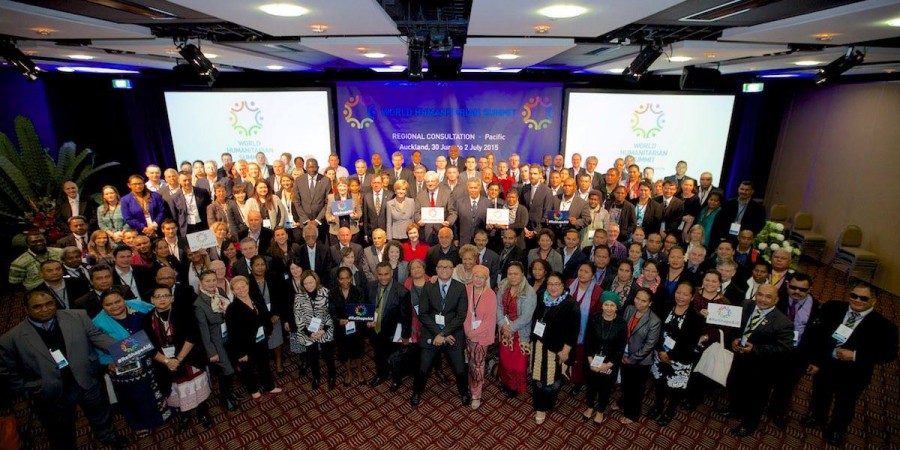Talks about the future of humanitarian action in the Pacific have wrapped up in New Zealand with calls for stronger partnerships with vulnerable and crisis affected communities.
“Pacific Islanders live with the threat of disaster and climate change every day. These communities have a great deal to teach us about effective emergency response and the humanitarian community is keen to learn what it can do better,” said Stephen O’Brien, the United Nations Under-Secretary-General of Humanitarian Affairs and Emergency Relief Coordinator.
More than 140 delegates from across the Pacific gathered in Auckland for the seventh of eight regional consultations ahead of the first World Humanitarian Summit in Istanbul in May 2016.
“For this region, the stakes could not be higher with Pacific Island Nations making up four of the top 10 countries on the 2014 World Risk Index,” Mr O’Brien said. “We are open to new approaches, partnerships and technologies that could reduce the suffering caused by emergencies in the Pacific and beyond. This includes managing the effects of climate change which are already causing displacement in the region.”
The meeting was co-chaired by New Zealand, Australia and the United Nations Office for the Coordination of Humanitarian Affairs (UNOCHA) and brought together representatives of disaster-affected communities, civil society, governments, international aid agencies, the United Nations, Red Cross, academia and the private sector in the Pacific.
“The strong message from people in the Pacific has been that affected and vulnerable communities, especially women, girls, the elderly and people with disabilities, need to be at the centre of humanitarian action,” Mr O’Brien said.
This was a priority echoed by United Nations Development Programme Administrator Helen Clark. “A vital area to address is the disproportionate impact of disasters on women and girls. More women than men die in most disasters; for example, seventy per cent of those who died in the 2009 Tonga tsunami were women,” Miss Clark said.
The importance of reshaping relationships amongst key humanitarian actors was acknowledged across the board in Auckland.
“We need to build strong, trusting partnerships between responders and those impacted by emergencies so that communities get the right help, from the right people, at the right time,” Mr O’Brien said.
This sentiment was echoed by governments represented at the meeting. “The question is: ‘Do you trust us, do the donors trust us? So far as I can see there is very little trust between ourselves and them, particularly when a disaster occurs.” Niue Premier Toke Talagi said.
A range of participants suggested that a key way to build that trust is to better utilize local skills in emergencies.
“For people living in the most fragile places, reform of humanitarian systems is about survival…. You don’t need us to dictate to you, you need us to partner with you on disasters,” the World Food Program’s Executive Director Ertharin Cousin said.
The importance of local community engagement was reflected strongly in discussions over Tropical Cyclone Pam which struck the region with devastating impacts earlier this year. The lessons learned during this disaster were still raw for Cyclone Pam survivor, Nemi Naparau. “We need more help with preparedness. We need a safe place to stay before cyclones strike. I want to tell everyone that you have to put yourselves in the shoes of survivors.”
Climate change was identified as the ‘elephant in the room’ with weather patterns already creating real challenges for low-lying islands across the region. “You can see whole islands being swallowed by climate change in the Pacific. It is very scary,” Tuvalu Prime Minister, Enele Sosene Sopoaga, told the meeting.
The President of Kiribati, Anote Tong, ended the meeting with an impassioned plea for the world to tackle the human dimensions of climate change. “Climate change is not about the environment, it’s not about two degrees change, it’s about people,” the President said before winning a standing ovation from delegates. “Climate change is the most fundamental moral challenge for humanity…. At the rate we are going, it doesn’t seem likely we will be able to keep what we have for our children.”
For many at the meeting, the bottom line is a need to invest more heavily in preparedness and disaster risk reduction. “The importance of disaster risk reduction, needs to be centre stage…. While every society and community is vulnerable to risk, some suffer far less harm and recover far more quickly than others There is a direct relationship between how quickly a community recovers from a crisis of any kind, and the quality of the development which came before,” UNDP Administrator Helen Clark said.
The outcomes from the Pacific consultations will feed into a global stakeholder consultation meeting in Geneva in October and then World Humanitarian Summit in Istanbul in May 2016.
“I’d like to thank everyone across the Pacific who has been part of this process which is setting an ambitious forward agenda for humanitarian action,” Mr O’Brien said. “We are seizing this opportunity with enthusiasm to create more coherent humanitarian action that embraces sustainable development, new technologies and investment in disaster risk reduction and preparedness, as well as response.”
Read the Co-Chairs’ Summary for the Pacific Regional Consultation here.


Comments